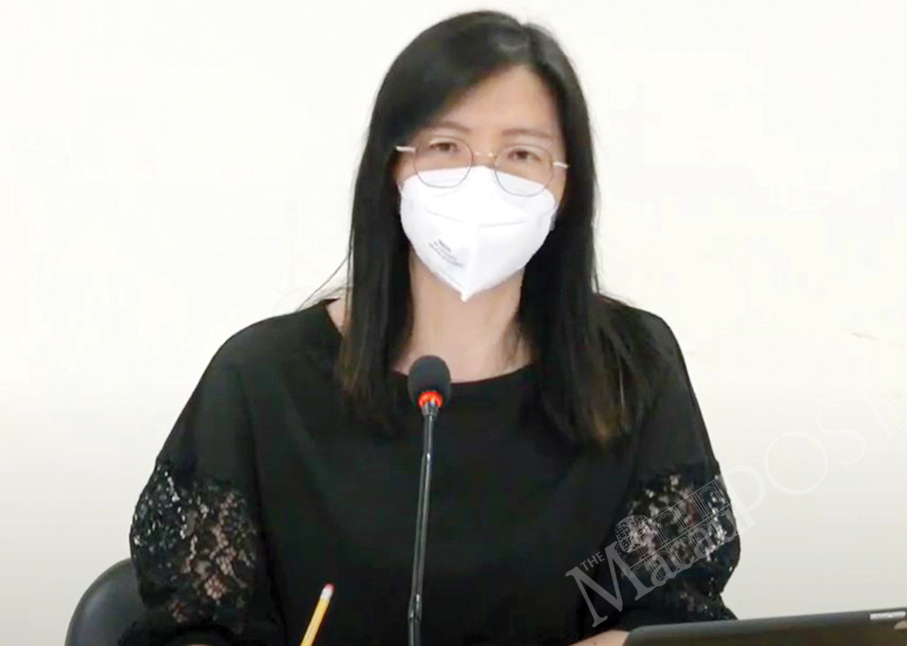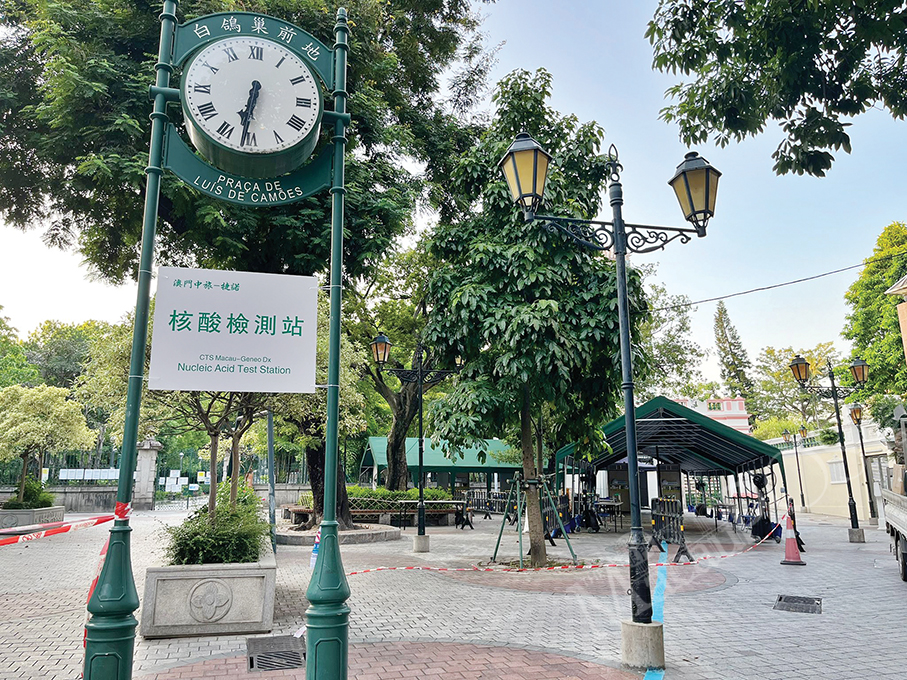2022-07-25 03:40 BY Tony Wong Comment:0
The Health Bureau (SSM) announced yesterday that Philippine nationals and property management staff will no longer be required to undergo a daily COVID-19 nucleic acid test (NAT) from today.
Leong Iek Hou, who heads the Communicable Disease Prevention and Control Division of the Health Bureau, made the announcement during yesterday evening’s daily press conference about the city’s current COVID-19 outbreak, which was detected on June 18.
Leong stressed, however, that Philippine nationals and property management staff going to work are still required to undergo a nucleic acid test every other day through Friday.
Leong said that the Health Bureau has decided to no longer list Philippine nationals and property management staff as high-risk key groups of people subject to a mandatory daily nucleic acid test, after considering the results of both groups’ several consecutive days of NATs and the findings of the bureau’s epidemiological investigations into the current outbreak’s latest cases.
On the other hand, those working at construction sites have been newly added to high-risk key groups of people. Their mandatory daily nucleic acid tests, which were announced during Saturday’s press conference about the viral menace, took effect yesterday.
Consequently, those in seven occupations are currently listed as high-risk key groups of people who are required to undergo a nucleic acid test every day for six days through Friday, namely security staff, cleaning staff, restaurant staff, food deliverers, public bus drivers and taxi drivers, live-out domestic helpers, and construction-site workers.
A mandatory daily nucleic acid test for high-risk key groups of people is part of the government’s measures implemented for the ongoing seven-day period aiming to consolidate Macau’s achievements in its battle against the current COVID-19 outbreak. The consolidation period commenced at 00:00 a.m. on Saturday and is slated to end at 11:59 p.m. on Friday.
Except construction-site workers whose mandatory daily nucleic acid tests started yesterday, those in the other six occupations have been classified for different periods of time as high-risk key groups of people subject to a mandatory test every day. Property management staff had been required to undergo a daily nucleic acid test since early this month.
All Philippine nationals in Macau, including those holding a Macau ID card, were required to undergo a daily nucleic acid test for three days from Friday to yesterday. The Health Bureau’s then decision to classify Philippine nationals in the city as a high-risk key group of people was justified by the fact that Philippine nationals have accounted for a “high” percentage of the tally of Macau’s current COVID-19 outbreak.
When announcing Philippine nationals’ now-defunct mandatory daily nucleic acid tests during Thursday’s COVID-19 press conference, Health Bureau officials noted that 171 out of the current outbreak’s then tally of 1,795 as of Wednesday had been Philippine nationals – who did not include those holding a Macau ID card, or 9.5 percent of the then tally. The officials also said that Philippine nationals in Macau tend to meet each other “very often”.
Health Bureau officials noted during Friday’s COVID-19 press conference that Philippine nationals accounted for 24.5 percent of the community COVID-19 cases detected over the past two weeks. The officials underlined that the Health Bureau’s compulsory nucleic acid testing of a certain group of nationalities had nothing to do with discrimination or labelling. The officials reaffirmed that the bureau’s decisions to classify certain groups as high-risk key groups aimed to detect hidden transmission chains, in which case possible COVID-19 carriers could receive treatment early, and death and serious cases could be prevented.
The officials also pointed out on Friday that last year non-resident workers from Nepal and Vietnam were also ordered to undergo frequent mandatory nucleic acid tests within a period of time, and nationals from Myanmar were also ordered to undergo mandatory tests shortly after the start of the current COVID-19 outbreak last month.
Daily self-test continues for everyone
Meanwhile, Leong also reminded the public during yesterday’s press conference that everyone must continue to self-test for COVID-19 with a rapid antigen test (RAT) kit every day through Sunday (July 31).
The government is yet to decide whether to extend the ongoing seven-day consolidation period, which is slated to end at 11:59 p.m. on Friday. The government will carry out a new round of mandatory citywide nucleic acid tests for everyone on Saturday and Sunday (July 31).
Leong warned that those failing to self-test with a RAT kit will have their Macau Health Code colour turn yellow the next day. Those whose health code colour has become yellow will have it return to green after undergoing a rapid antigen test and reporting the result on the government’s RAT online platform. If they still do not undergo a self-test, Leong said, their health code colour will even turn red the day after, in which case, Leong said, their health code colour will only return to green after they undergo a nucleic acid test.
All those who have to leave home for work but are not in high-risk key occupations are required to undergo a nucleic acid test every other day for a period of six days from yesterday through Friday. The tests every other day do not cover those who work from home.
Stricter criteria for setting-up of yellow-code zones
Meanwhile, from yesterday the government has been implementing stricter criteria for buildings to be classified as a yellow-code zone, according to which buildings located around a red-code zone building will be listed as yellow-code zones. Health Bureau officials said during Saturday’s COVID-19 press conference that stricter measures were needed following the detection of COVID-19 cases in a particular building as Macau has entered a consolidation period.
In addition, those living in a yellow-code zone are now required to undergo more frequent nucleic acid tests. According to the new measures that started yesterday, they are required to undergo a nucleic acid test on the first, second, third, fifth and seventh days after their building is listed as a yellow-code zone, a change from the previous arrangements in which they were required to be tested on the first, second, fourth and seventh days.
Tally reaches 1,810
The latest tally of Macau’s current COVID-19 outbreak has increased by just five to 1,810, according to a Novel Coronavirus Response and Coordination Centre statement yesterday morning. The five new locally transmitted cases were detected between 00:00 a.m. and 11:59 p.m. on Saturday, raising the outbreak tally from 1,805 as of Friday night to 1,810 as of Saturday night.
The outbreak tally was up by five from 1,795 to 1,800 on Thursday, and also up by five to 1,805 on Friday.
Of the five new local cases reported on Saturday, none was detected in the community. All five cases were detected in locked-down (red-code zone) buildings and medical observation quarantine hotels.
No community cases were detected on Thursday, while one case was detected in the community on Friday.
Outdoor NAT stations
Meanwhile, Leong noted that the government is now setting-up outdoor nucleic acid test (NAT) sampling stations in certain locations across the city, which will be used as regular NAT sampling stations for the foreseeable future when the city returns to normalised COVID-19 prevention and control period after the current outbreak is basically over.
Leong noted that many of the current NAT stations used for citywide testing are located in schools, adding that they can no longer be used after the next school year starts in September.
Leong said that more regular NAT stations across the city are needed during the normalised COVID-19 prevention and control period, as the government plans to continue with its regular mandatory nucleic acid testing for more occupations in the longer run, with the aim of detecting possible cases in the community as early as possible.
Leong noted that currently the city only has several regular NAT stations, adding that more stations would make it more convenient for residents to undergo a test.

Leong Iek Hou, who heads the Health Bureau’s (SSM) Communicable Disease Prevention and Control Division, addresses yesterday’s press conference about the city’s current COVID-19 outbreak. Photo: GCS

This photo taken yesterday shows an outdoor nucleic acid test (NAT) sampling station being set up outside Luís de Camões Park. – Photo: Maria Cheang Ut Meng
 Lawmakers pass bill axing all property market curbs
Lawmakers pass bill axing all property market curbs
 4 schoolboys bully, insult elderly woman: police
4 schoolboys bully, insult elderly woman: police
 Ho vows to study measures to ‘more strongly’ support SMEs
Ho vows to study measures to ‘more strongly’ support SMEs